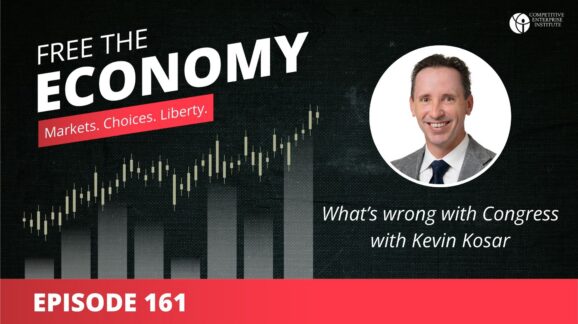There are two main areas in which Congress can enact meaningful reform. The first is to rein in regulatory guidance documents, which we refer to as “regulatory dark matter,” whereby agencies regulate through Federal Register notices, guidance documents, and other means outside standard rulemaking procedure. The second is to enact a series of reforms to increase agency transparency and accountability of all regulation and guidance. These include annual regulatory report cards for rulemaking agencies and regulatory cost estimates from the Office of Management and Budget for more than just a small subset of rules.
In 2019, President Trump signed two executive orders aimed at stopping the practice of agencies using guidance documents to effectively implement policy without going through the legally required notice and comment process.
Featured Posts

Blog
Free the Economy podcast: What’s wrong with Congress with Kevin Kosar
In this week’s episode we talk about we talk about Consumer-Regulated Electricity, the amazing falling US poverty rate, and how smart…

Blog
Trump’s deregulation meets invisible rulemaking: The real 2026 challenge
After a brief shutdown, most fiscal year 2026 appropriations have been enacted, despite continued debate over Department of Homeland Security (DHS) funding. We may soon…

Blog
The week in regulations: Beet food coloring and crab housekeeping
Culture warriors got upset over the Super Bowl halftime show. A mini-shutdown over ICE funding delayed some labor market indicators. Agencies issued new regulations ranging…
Search Posts
Blog
This Week in Ridiculous Regulations
Coronavirus deaths topped 1,000 in the U.S. last week, while new cases continued to double every few days. Meanwhile, agencies issued new final regulations ranging…
Blog
VIDEO: Reforming Antitrust for Global Competitiveness
The Information Technology and Innovation Foundation recently hosted its latest virtual event, “Reforming Antitrust Policy for an Era of Global Competitiveness.” ITIF President Rob Atkinson…
Blog
Regulation, Not Offshoring, Is Hindering Industry from Ramping up Production
In his latest Bloomberg column, Noah Smith argues that offshoring production led to the current shortage of medical masks and equipment in the face of…
News Release
CEI Experts Blast Attempts to Politicize COVID-19 Relief Bill
While the nation suffers, Washington has descended into an unseemly squabble over the latest COVID-19 relief bill. Politicians from all quarters are attempting to expand…
Blog
This Week in Ridiculous Regulations
Governments are responding to the coronavirus with a getting rid of harmful regulations on restaurants, schools, and stores. Most of these rules were never needed…
Blog
Getting Rid of #NeverNeeded Regulations Hindering Coronavirus Response
What can Washington do to minimize harm from the coronavirus? Some of the best policy responses are coming not from imposing new regulations, but from…
Staff & Scholars

Clyde Wayne Crews
Fred L. Smith Fellow in Regulatory Studies
- Business and Government
- Consumer Freedom
- Deregulation

Ryan Young
Senior Economist and Director of Publications
- Antitrust
- Business and Government
- Regulatory Reform

Fred L. Smith, Jr.
Founder; Chairman Emeritus
- Automobiles and Roads
- Aviation
- Business and Government

Sam Kazman
Counsel Emeritus
- Antitrust
- Automobiles and Roads
- Banking and Finance

Marlo Lewis, Jr.
Senior Fellow
- Climate
- Energy
- Energy and Environment